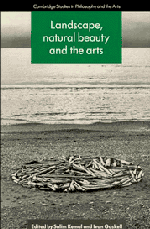Book contents
- Frontmatter
- Contents
- List of contributors
- Editors' acknowledgments
- 1 Nature, fine arts, and aesthetics
- 2 Natural beauty without metaphysics
- 3 Trivial and serious in aesthetic appreciation of nature
- 4 The public prospect and the private view: the politics of taste in eighteenth-century Britain
- 5 Landscape in the cinema: the rhythms of the world and the camera
- 6 The touch of landscape
- 7 Desert and ice: ambivalent aesthetics
- 8 Gardens, earthworks, and environmental art
- 9 Comparing natural and artistic beauty
- 10 Appreciating art and appreciating nature
- 11 The aesthetics of art and nature
- 12 On being moved by nature: between religion and natural history
- Index
2 - Natural beauty without metaphysics
Published online by Cambridge University Press: 03 May 2011
- Frontmatter
- Contents
- List of contributors
- Editors' acknowledgments
- 1 Nature, fine arts, and aesthetics
- 2 Natural beauty without metaphysics
- 3 Trivial and serious in aesthetic appreciation of nature
- 4 The public prospect and the private view: the politics of taste in eighteenth-century Britain
- 5 Landscape in the cinema: the rhythms of the world and the camera
- 6 The touch of landscape
- 7 Desert and ice: ambivalent aesthetics
- 8 Gardens, earthworks, and environmental art
- 9 Comparing natural and artistic beauty
- 10 Appreciating art and appreciating nature
- 11 The aesthetics of art and nature
- 12 On being moved by nature: between religion and natural history
- Index
Summary
The theme of this volume is natural beauty, landscape and the arts. The first question for a philosopher to ask is what does philosophy have to say now particularly about natural beauty. I emphasize now, because, as is well known, historically philosophers, for example, Plato and the eighteenth-century British, and especially Scottish, philosophers, were interested in the topic of beauty. At the present day there has also been some revival of interest in this subject, but when it comes to what philosophers past and present have had to say about beauty, I am doubtful how much relevance it has to the question of how we should think about natural beauty. We must be careful then in an inquiry into natural beauty not to begin by taking up some question within the traditional philosophy of beauty – such as for instance whether beauty is a real quality, or whether judgments of beauty are subjective or objective – for it is difficult to see what such metaphysical lucubrations could do for the question in hand, other than offering, what is not to be underestimated, an innocent form of academic pleasure.
In any case, the modern world takes a short cut with the question of beauty: everyone, unless having a distinct reason for believing the contrary, such as a specific religious faith, unhesitatingly takes it for granted that an extreme subjectivism and relativism must hold sway.
- Type
- Chapter
- Information
- Landscape, Natural Beauty and the Arts , pp. 43 - 64Publisher: Cambridge University PressPrint publication year: 1993
- 24
- Cited by



